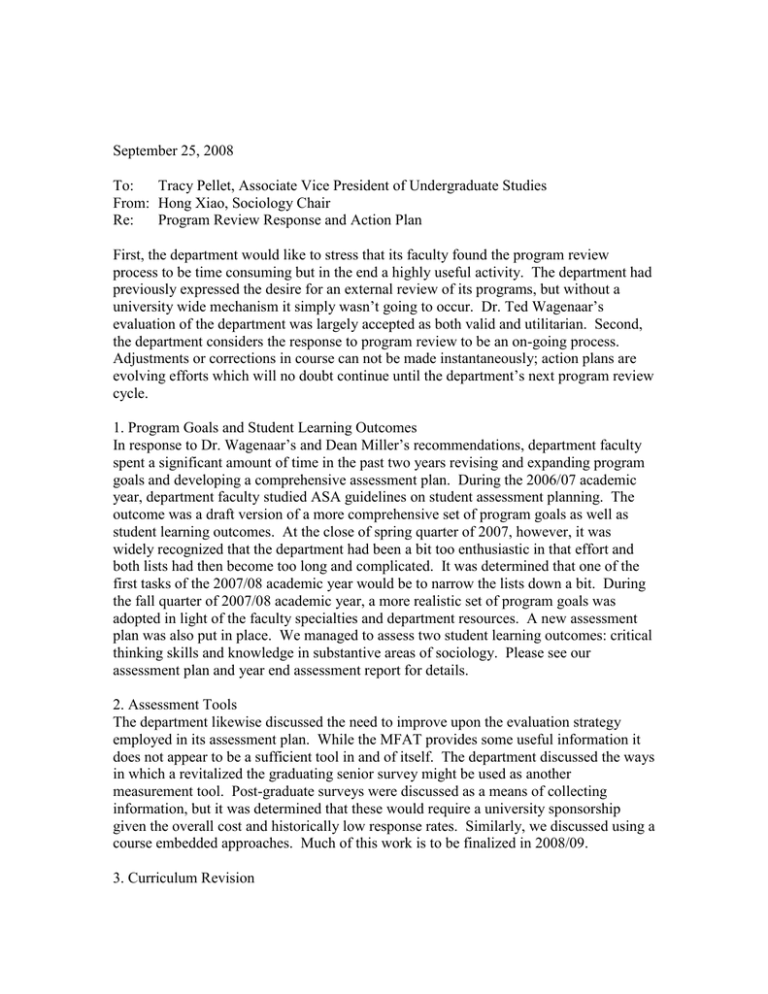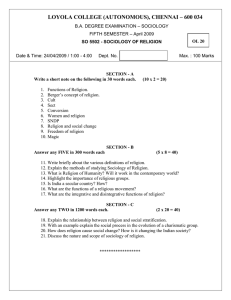September 25, 2008 To: Tracy Pellet, Associate Vice President of Undergraduate Studies
advertisement

September 25, 2008 To: Tracy Pellet, Associate Vice President of Undergraduate Studies From: Hong Xiao, Sociology Chair Re: Program Review Response and Action Plan First, the department would like to stress that its faculty found the program review process to be time consuming but in the end a highly useful activity. The department had previously expressed the desire for an external review of its programs, but without a university wide mechanism it simply wasn’t going to occur. Dr. Ted Wagenaar’s evaluation of the department was largely accepted as both valid and utilitarian. Second, the department considers the response to program review to be an on-going process. Adjustments or corrections in course can not be made instantaneously; action plans are evolving efforts which will no doubt continue until the department’s next program review cycle. 1. Program Goals and Student Learning Outcomes In response to Dr. Wagenaar’s and Dean Miller’s recommendations, department faculty spent a significant amount of time in the past two years revising and expanding program goals and developing a comprehensive assessment plan. During the 2006/07 academic year, department faculty studied ASA guidelines on student assessment planning. The outcome was a draft version of a more comprehensive set of program goals as well as student learning outcomes. At the close of spring quarter of 2007, however, it was widely recognized that the department had been a bit too enthusiastic in that effort and both lists had then become too long and complicated. It was determined that one of the first tasks of the 2007/08 academic year would be to narrow the lists down a bit. During the fall quarter of 2007/08 academic year, a more realistic set of program goals was adopted in light of the faculty specialties and department resources. A new assessment plan was also put in place. We managed to assess two student learning outcomes: critical thinking skills and knowledge in substantive areas of sociology. Please see our assessment plan and year end assessment report for details. 2. Assessment Tools The department likewise discussed the need to improve upon the evaluation strategy employed in its assessment plan. While the MFAT provides some useful information it does not appear to be a sufficient tool in and of itself. The department discussed the ways in which a revitalized the graduating senior survey might be used as another measurement tool. Post-graduate surveys were discussed as a means of collecting information, but it was determined that these would require a university sponsorship given the overall cost and historically low response rates. Similarly, we discussed using a course embedded approaches. Much of this work is to be finalized in 2008/09. 3. Curriculum Revision Several curriculum changes occurred in response to the program review recommendations. First, both Dean Miller and Dr. Wagenaar recommended curricular reform; specifically a lack of a statistics requirement in the 45 hour B.A. program and, given low enrollments, the necessity of the 75 hour B.S. program. In spring 2007 the department voted unanimously to require statistics in all sociology programs. Paperwork was submitted the fall of 2008 and the new requirement was to be in effect at the beginning of 2008/09 academic year. The new tenure track hire in the areas of statistics will enable the department to offer the statistics course each quarter and meet students demand for the course. The faculty spent a great deal of time discussing the merits of the B.S. program. It was finally determined that it should be retained before other curriculum changes take place. Second, a new senior capstone course was added to both sociology and social service programs, providing graduating seniors an opportunity to reflect upon their educational experience in the department and prepare for the transition from CWU to life after college. The seminar requirements include a portfolio, self assessment paper, resume/vita, job/graduate school search assignment, and MFAT test. It is our hope that the senior portfolio will also assist the department in student learning assessment. Third, Cumulative GPA for department majors has been increased to 2.3, higher than the university requirement. We have made curriculum changes to revive the honors in sociology program. Major changes include: a 3.5+ cumulative GPA, 10+ credits in sociological research work, completion of a research project, and a public presentation. Fourth, faculty members have continued our discussion on revising the existing categories of courses. Since majority of sociology majors do not go to graduate school, we want to redesign our program to better prepare our students for career goals. During the faculty retreat in spring 2008, we began to map out areas of cncentration/specialization within sociology degree program. This work will continue in the coming year. 4. Department Visibility The department remains at somewhat of a loss regarding the challenge or call to increase the department’s visibility and reputation on campus raised by Dean Miller and Dr. Wagenaar. Many of the faculty members have participated on university committees and presentations; the department customarily exhibits one of the highest student-to-faculty ratios on campus (especially in upper-division courses through its service coursework). Perhaps what is necessary is to revitalize some members of the department who tend not to contribute to these efforts and doing what does not come natural to this particular mix of individuals—bragging about and circulating our accomplishments. However, we did begin to promote sociology program by bringing speakers to campus and co-sponsoring university wide programs such as Symposium Without Borders and Natural History Mead Film and Video Festival.

